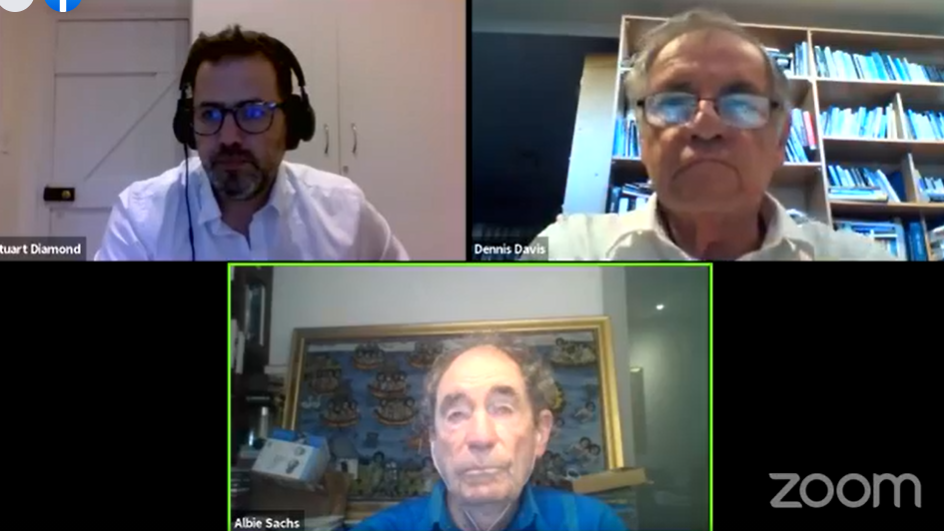
Featured Item

Jewish values central to SA democracy, judges say
Jews continue to play a pivotal role in securing democracy in post-apartheid South Africa, their values and social consciousness central to the democratic project.
So say esteemed judges Albie Sachs and Dennis Davis, two towering legal giants who have become household names following years of furthering justice in South Africa. Last Thursday, 18 March, they reflected on the 25-year journey of the South African Constitution through the lens of their Jewish identity.
“His Jewishness is central to his being,” Sachs said of Davis at the online event hosted by the Cape South African Jewish Board of Deputies. “He sees the world through Jewish eyes, not narrow eyes, but eyes filled with a sense of reason, idealism, compassion, questioning, and challenging.
“Dennis is one of the great parts of South African public life, with an energy and pungency of a vigorous mind.”
Davis described Sachs similarly, stressing that it was impossible to encapsulate Sachs’ career in a few minutes.
“This is someone who has almost every aspect that any person could be proud of,” he said. “His early career was central to [the development of] non-racism, and he transcended all the atrocities that apartheid wrought upon him.
“You don’t need to study Talmud to know it, but if you want to understand its two fundamentals of G-d’s justice and compassion, just look at Albie’s career. He encapsulates both of those with eloquence and power.”
Indeed, Sachs said that in spite of his secular upbringing and not believing in G-d, his Jewishness resonated deeply within him, and informed much of his approach to the law.
“I was the youngest in my class during World War II. Half of the boys in the school were Jews, and one by one, they had their Barmitzvahs. I was the youngest, and as they celebrated their Barmitzvahs, they would ask, ‘Albie, when’s your barmy?’ I just kept quiet.”
“My mom told me that if I wanted to have a barmy, she would support me as much as if I didn’t. I grew up in a very secular home. My parents gave me the choice, and it was the hardest decision I had to make completely on my own.
“I thought that if I went through with it, I would be dishonouring myself and G-d, if he existed. I didn’t believe in G-d, and I couldn’t have a Barmitzvah if I didn’t. It was painful being a Jew but being an outsider like that as well.”
Nonetheless, Sachs felt a distinct bond with his Jewish identity, connecting with figures like Marx, Freud, and Einstein.
“These are my heroes,” he said. “Jews who were displaced but very much part of the world. Theirs is my kind of Judaism. My parents gave me a sense of honour and integrity, and while these aren’t exclusively Jewish, they are part of my Jewishness.”
The judges reflected on the Constitution, agreeing that it remains one of South Africa’s defining achievements.
“Years before the Constitution was brought in, I had a student who came into the library and gave me a crumpled copy of a document penned by Albie about human rights in South Africa,” recalled Davis. “It was extraordinary, and it showed a lot of thinking that went into the Bill of Rights later.
“What was unbelievable was that we didn’t have a war here. The African National Congress had the stronger forces, but it didn’t impose anything. The Bill of Rights was a negotiated settlement, and it fitted with what Albie had captured years before.”
This document offered the best possible hope for constitutional democracy in South Africa, said Davis.
“It wasn’t a sell-out. We need to defend it and be proud of it. It secured a social democracy which offers the best chance for all of us to live in peace and harmony.”
Sachs agrees, saying that in spite of the corruption which plagues the country, we cannot lose sight of what the Constitution means for South Africa.
“It remains a huge achievement. Yes, so many things are bad, but we know about them in an open society, which owes itself to the Constitution. We have free and fair elections, something we take for granted.
“It doesn’t make up for corruption and crime, but it gives us a framework to challenge, speak our minds, and feel free.”
Both judges say that the Jewish community continues to play a role in broader South African society.
“The Jewish community is well implanted, and has adapted better than many other whites,” said Sachs. “This is partly because people like Dennis are in the community and remind other people of the wider issues.
“People respect ideas, values, idealism, and compassion. I see a strong presence of Jews, and while they are very diverse, they’re also very coherent, with many networks and support.”
Davis agrees. “Like many of my generation, when people like Albie were in exile, it seemed the values he espoused would never come to pass. I thought about leaving at one point, and even sat the Israeli bar exam and passed.”
Davis then took to politics, however, and chose to remain in his native country.
“This was where I was born, and where I wanted to be,” he said. “It was my struggle. It seems to me that right from those days, the right thing to do is to do the best for South Africa, and that remains the case today.
“I’m continually saddened by those who leave. We’ve lost so much talent, and I think how much it could have contributed to the betterment of our society.
“My Judaism is conflicted between Marxist tradition and studying Talmud. Central for me is what we say each day in the Aleinu, that our job is to purify the world in the image of G-d. It means to inculcate our foundational values into society.
“Judaism traditionally ascribed thirteen attributes to G-d,” said Davis. “We need to apply these in South African society.
“We need to comport ourselves in line with those attributes. How much compassion, justice, mercy, and forgiveness should we have in order to recalibrate our society? We are really privileged to do this.
“If you want to go to Australia, be my guest. But if you want a moral challenge which comports itself with the values of our Jewish tradition, South Africa is the place. I want to throw in my lot with those who stay here.”










